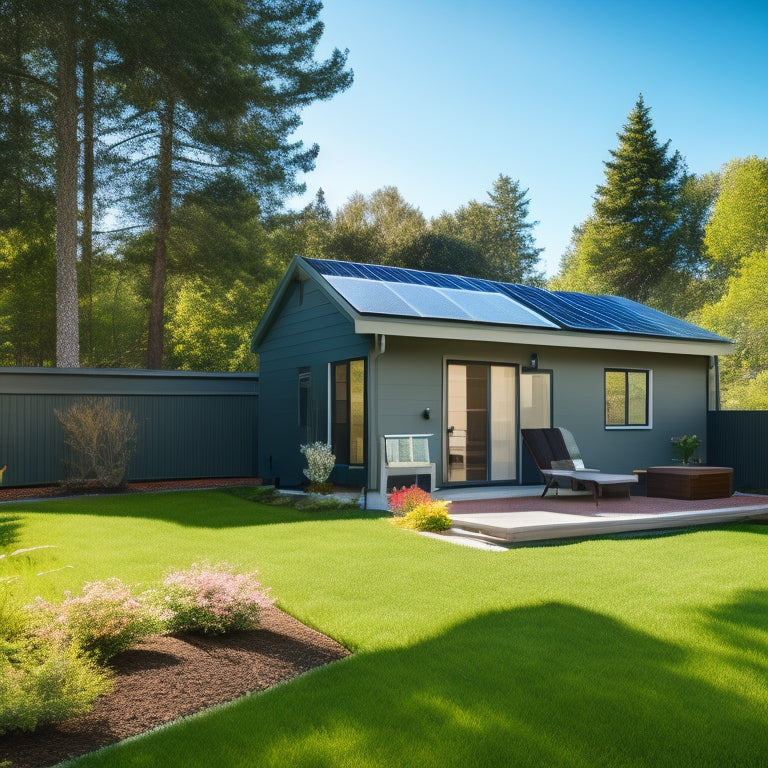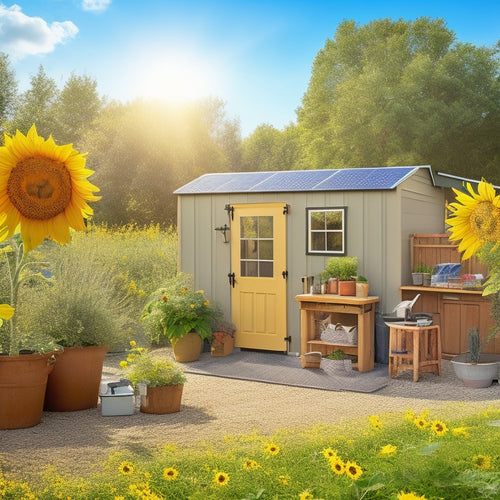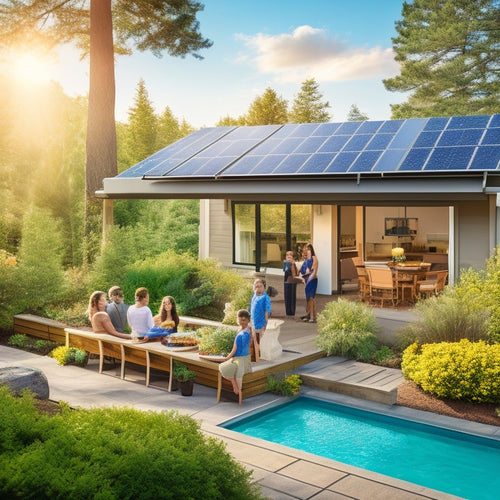
Emergency Power Solution: Solar Panel Battery Backup
Share
You need a reliable emergency power solution to keep your home running during outages. A solar panel battery backup system is the perfect answer, providing up to 100% of your home's power when the grid fails. This renewable energy solution harnesses sunlight to charge your battery, ensuring a steady energy flow even at night or during low sunlight. By choosing the right battery size and type, you'll enjoy uninterrupted power for your critical appliances. As you explore this energy-independent solution, you'll discover the benefits of reduced carbon footprint, lower energy bills, and enhanced resilience – and that's just the beginning.
Key Takeaways
• A solar panel battery backup system provides reliable emergency power during grid outages, protecting your home and family from power disruptions.
• It enhances energy independence and resilience, reducing reliance on the grid and providing renewable security and peace of mind.
• A properly sized solar panel battery backup system ensures seamless backup power during extended grid failures, maintaining critical systems and reducing downtime.
• By storing excess energy generated during the day, a solar panel battery backup system provides a cost-effective and environmentally friendly solution for emergency power needs.
• Regular maintenance and proper installation of the system ensure continuous power supply, even during prolonged outages, giving you peace of mind and confidence in energy independence.
Benefits of Solar Battery Backup
By incorporating a solar battery backup into your renewable energy system, you can access a plethora of benefits that greatly enhance your overall energy independence and resilience. This setup guarantees that you have a reliable source of power during outages, providing Renewable Security and peace of mind.
With a solar battery backup, you're no longer reliant on the grid, giving you Energy Independence and control over your energy needs.
You'll also reduce your reliance on fossil fuels, decreasing your carbon footprint and contributing to a cleaner environment. Additionally, a solar battery backup system can optimize your energy usage, reducing waste and saving you money on your energy bills.
By storing excess energy generated by your solar panels, you can use it when you need it most, such as during peak hours or at night. This setup also protects your appliances and electronics from power surges and spikes, extending their lifespan.
With a solar battery backup, you'll enjoy uninterrupted power supply, ensuring that your daily life and business operations remain unaffected by outages.
How Solar Panel Battery Works
As you've optimized your energy independence with a solar battery backup, let's explore the inner workings of this system, starting with the solar panel battery itself, which converts sunlight into electrical energy through a process called photovoltaics. This innovative technology enables you to harness renewable energy from the sun, reducing your reliance on the grid.
Here's how it works:
-
Solar Energy Absorption: The solar panels absorb sunlight, converting it into direct current (DC) electricity.
-
Energy Conversion: The DC electricity is then converted into alternating current (AC) electricity, making it usable in your home or business.
-
Energy Storage: Excess energy is stored in the battery for later use, ensuring a steady energy flow even during periods of low sunlight or at night.
Backup Power During Outages
When the grid goes down, you're left in the dark - literally. But with a solar panel battery backup, you're prepared to weather the outage.
Power Outage Preparation
You can protect your home and family from the disruptions caused by power outages by preparing a backup power system that includes a solar panel battery backup. This proactive approach guarantees you're not left in the dark when disaster strikes.
Effective disaster planning involves more than just having a plan – it demands a thorough emergency checklist to secure a seamless switch to backup power.
To make sure you're prepared, consider the following essential items:
-
Assess your energy needs: Calculate your energy requirements to determine the capacity of your solar panel battery backup.
-
Identify critical appliances: Determine which appliances are essential to keep running during an outage, such as refrigerators, medical equipment, or communication devices.
-
Develop a maintenance schedule: Regularly inspect and maintain your solar panel battery backup system to ensure it's always ready to provide power when needed.
Grid Failure Contingency
During extended grid failures, a solar panel battery backup system kicks in seamlessly, providing reliable backup power to your home or business. This guarantees that your critical appliances and devices remain operational, even when the grid is down. Grid failures can occur due to various reasons, including natural disasters, cyber-attacks, or physical damage to infrastructure, highlighting the grid's vulnerability.
In such scenarios, a solar panel battery backup system becomes an essential component of your emergency preparedness plan. By investing in a backup power system, you're taking a proactive step towards community preparedness, ensuring that your family, employees, or customers remain safe and comfortable during outages.
With a solar panel battery backup system, you can enjoy uninterrupted power supply, even when the grid is down. This means you can continue to operate your business, power your medical equipment, or keep your communication devices online, even in the face of an extended grid failure.
Reliable Energy Supply
A solar panel battery backup system guarantees a reliable energy supply, seamlessly switching to backup power mode the moment the grid fails, allowing you to maintain business continuity and keep critical appliances running. This means you can enjoy energy independence, free from the worries of power outages disrupting your daily operations.
With a solar panel battery backup system, you can:
-
Maintain critical systems: Keep your essential appliances and equipment running, ensuring minimal disruption to your daily activities.
-
Reduce downtime: Instantly switch to backup power, minimizing the impact of grid failures on your business or daily life.
-
Enhance power reliability: Enjoy a consistent and reliable energy supply, even when the grid fails, giving you peace of mind and confidence in your energy independence.
This reliable energy supply ensures that you can continue to operate smoothly, even during extended power outages.
Solar Battery Types and Options
When choosing a solar battery backup system, you'll need to evaluate the type of battery that best suits your needs.
You'll find that different battery chemistries, such as lead-acid, lithium-ion, and nickel-cadmium, offer varying levels of performance and durability.
Battery Chemistries Compared
You have several solar battery options to choose from, each with its unique characteristics, advantages, and limitations, which are largely defined by their underlying battery chemistries. When selecting a solar battery, it's crucial to comprehend the strengths and weaknesses of each chemistry to make an informed decision.
Here are three key battery chemistries to keep in mind:
-
Lithium-ion (Li-ion): Offers high energy density, long cycle life, and low self-discharge rates. However, Lithium limitations include higher upfront costs and potential thermal runaway risks.
-
Nickel-Cadmium (Ni-Cd): Provides a low upfront cost, high discharge rate, and good cycle life. However, Nickel nuances include toxicity concerns, memory effect, and limited recyclability.
-
Lead-Acid: Offers a low upfront cost, well-established manufacturing infrastructure, and ease of recyclability. However, it has lower energy density, shorter cycle life, and higher self-discharge rates compared to other chemistries.
When choosing a solar battery, take into account your specific needs, budget, and performance requirements. By understanding the characteristics of each battery chemistry, you can make an informed decision that meets your emergency power solution needs.
Deep Cycle Options
Deep cycle solar batteries, designed to provide a steady flow of energy over an extended period, are a fundamental component of your emergency power solution, and selecting the right type depends on your specific energy needs and budget constraints.
When choosing a deep cycle battery, you'll want to take into account factors like Cycle Life, which refers to the number of charge and discharge cycles a battery can handle before its capacity starts to degrade. Look for batteries with a high Cycle Count to guarantee a longer lifespan.
Battery Durability is also essential, as it affects the overall performance and reliability of your emergency power solution. A battery with a high Depth Discharge (DOD) rating can handle deeper discharges without compromising its performance. Additionally, consider batteries with Low Maintenance requirements to reduce upkeep costs and extend their lifespan.
For peak performance, opt for High Capacity batteries that provide a steady flow of energy. Fast Charging capabilities will also ensure your battery is quickly replenished.
Choosing the Right Battery Size
Determine your energy needs by calculating your total daily energy consumption in watt-hours (Wh) to accurately size your solar panel battery backup system. This calculation will give you a clear understanding of your energy demands, which is essential in choosing the right battery size.
To make sure you're getting the right fit, consider the following factors:
-
Peak power requirements: Identify the maximum power required by your appliances during peak usage hours.
-
Energy storage capacity: Calculate the total energy storage capacity needed to meet your daily energy demands.
-
Depth of discharge (DOD): Determine the maximum DOD allowed by your battery to guarantee a safe and efficient operation.
Solar Panel System Requirements
When designing a solar panel system for emergency power backup, you'll need to take into account the system size and energy storage needs.
The system size will depend on the amount of power you need to generate during an outage, while energy storage needs will depend on how long you want the backup power to last.
System Size Considerations
Sizing a solar panel system requires determining your total energy needs, which involves evaluating your power usage patterns and identifying the essential appliances you want to back up during an outage. To get an accurate estimate, you'll need to assess your energy demands and design a system that meets those needs.
Here are three key considerations for system size:
-
Load Analysis: Identify the essential appliances you want to power during an outage, such as refrigerators, lights, and medical equipment. Calculate the total wattage required to power these appliances.
-
Panel Configuration: Determine the best panel configuration to meet your energy demands. This includes selecting the right panel size, number of panels, and array setup.
-
System Design: Design a system that integrates your solar panel array with a battery backup system, ensuring smooth power switch during outages.
Energy Storage Needs
With your essential appliances identified, you'll need to calculate how much energy storage you require to keep them running during an extended outage, considering factors like battery type, depth of discharge, and desired backup time. This calculation will help determine the Energy Capacity of your solar panel battery backup system.
To accurately size your energy storage system, you'll need to assess the Power Demands of each appliance during an outage. This includes understanding the wattage and voltage requirements of each device, as well as the total energy consumption over a given period.
For instance, if you want to power a refrigerator, computer, and a few lights for 8 hours, you'll need to calculate the total watt-hours (Wh) required. This information will help you determine the suitable battery type, capacity, and configuration for your solar panel battery backup system.
Installation and Maintenance Tips
Prior to installing your solar panel battery backup system, make sure you've chosen a location that receives minimal shading and is easily accessible for future maintenance. A thorough site assessment is important to guarantee your system operates efficiently.
When installing your system, keep the following tips in mind:
-
Cable management: Organize your cables neatly to prevent damage and ensure easy maintenance.
-
Inverter selection: Choose an inverter that meets your energy needs and complies with local electrical codes.
-
Panel cleaning: Regularly clean your solar panels to maintain peak energy production.
Proper installation and maintenance are critical to the performance and longevity of your solar panel battery backup system. Ensure your system is properly grounded to prevent electrical shocks and fires.
Always follow local electrical codes and regulations to avoid any potential hazards. By following these installation and maintenance tips, you'll be able to enjoy a reliable and efficient emergency power solution.
Cost-Effective Energy Solution
Opting for a solar panel battery backup system proves to be a cost-effective energy solution, allowing you to generate free energy while reducing your reliance on the grid. By harnessing the power of the sun, you'll greatly lower your energy bills and minimize your carbon footprint.
This energy-efficient solution enables you to store excess energy generated during the day for use during the night or during power outages, ensuring a steady supply of power.
As a green initiative, solar panel battery backup systems promote energy efficiency and reduce your dependence on non-renewable energy sources. By investing in this technology, you'll not only save money on your energy bills but also contribute to a cleaner, more sustainable environment.
With a solar panel battery backup system, you'll enjoy a reliable and efficient energy solution that's tailored to your specific needs. By making the switch, you'll be joining the growing community of individuals and businesses committed to reducing their environmental impact.
Environmental Impact and Savings
By investing in a solar panel battery backup system, you're not only reducing your energy bills but also greatly minimizing your carbon footprint, which leads to a substantial decrease in greenhouse gas emissions and mitigates the strain on the environment.
As you join the renewable energy revolution, you'll be contributing to a cleaner, greener future. Here are just a few ways you'll be making a positive impact:
-
Reducing greenhouse gas emissions: By harnessing solar power, you'll be decreasing your reliance on fossil fuels and lowering your carbon emissions, which is essential in the fight against climate change.
-
Promoting eco-friendly solutions: Your investment in solar energy supports the development of innovative, eco-friendly solutions that can help mitigate the environmental impact of human activity.
-
Supporting renewable energy: By choosing solar power, you're driving demand for renewable energy sources and paving the way for a sustainable future.
Ensuring Continuous Power Supply
What would happen to your daily routine if the power suddenly went out, leaving you without electricity for hours or even days? You'd likely face disruptions in your daily activities, from cooking and refrigeration to communication and entertainment. Ensuring continuous power supply is essential in today's digital age.
A solar panel battery backup system provides power redundancy, guaranteeing energy resilience in the face of grid outages. This setup ensures that your home or business remains operational, even when the grid fails.
With a battery backup system, you'll have a reliable source of power to fall back on, minimizing downtime and keeping your daily routine uninterrupted. By incorporating energy storage into your solar panel system, you'll enjoy uninterrupted power supply, even during extended grid outages.
This means you can continue to power your essential appliances, stay connected, and maintain business continuity – all while reducing your reliance on the grid. By investing in a solar panel battery backup system, you're investing in energy resilience and peace of mind.
Frequently Asked Questions
Can I Use Solar Panel Battery Backup With Existing Solar Panels?
You can integrate a solar panel battery backup with your existing panels, guaranteeing system integration and leveraging energy storage for cost-effectiveness, but first, verify panel and inverter compatibility to secure seamless operation.
How Long Does It Take to Fully Charge a Solar Battery?
You'll find that the charging time for a solar battery depends on factors like panel size, battery capacity, and charging cycles. Be prepared for power fluctuations, and expect a full charge in 5-8 hours with a properly sized system.
Are Solar Panel Battery Backups Suitable for Small Homes?
You'll find solar panel battery backups suitable for small homes, as they overcome space constraints, offering energy efficiency, homeowner benefits like grid independence, and cost savings, making them an innovative solution for your residence.
Can I Add More Batteries to My Existing Solar Panel System?
'A million times yes, you can exponentially expand your energy storage! You're not limited to your initial setup; upgrading to more batteries enables seamless Battery Enhancements, enabling Energy Expansion and amplifying your system's capabilities.'
Do Solar Panel Battery Backups Require Regular Maintenance?
You'll want to perform regular maintenance on your solar panel battery backup to guarantee maximum energy storage and grid independence during power outages. Stick to maintenance schedules to prolong battery lifespan and optimize performance.
Related Posts
-

Building an Emergency Backup Solar Power System in 5 Essential Steps
Building an emergency backup solar power system involves five key steps. First, assess your daily energy needs to ide...
-

Top Portable Refrigerators for Camping Adventures
When you're camping, having a reliable portable refrigerator can make all the difference for keeping your food fresh ...
-

Top-Rated Home Solar Power Kits for Achieving Energy Independence
Top-rated home solar power kits enable you to achieve energy independence by greatly cutting your energy costs. You c...


